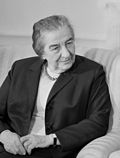Second Meir Cabinet | |
|---|---|
| 15th Cabinet of Israel | |
 | |
| Date formed | 15 December 1969 |
| Date dissolved | 10 March 1974 |
| People and organisations | |
| Head of state | Zalman Shazar (until 1973) Ephraim Katzir (from 1973) |
| Head of government | Golda Meir |
| Member parties | Alignment Gahal (until August 1970) National Religious Party Progress and Development Independent Liberals Cooperation and Brotherhood |
| Status in legislature | Coalition |
| Opposition leader | Yitzhak-Meir Levin (until 1970) Menachem Begin (from 1970) |
| History | |
| Election | 1969 Israeli legislative election |
| Legislature term | 7th Knesset |
| Predecessor | 14th Cabinet of Israel |
| Successor | 16th Cabinet of Israel |
The fifteenth government of Israel was formed by Golda Meir on 15 December 1969 following the October elections. The government was a continuation of the national unity government formed during the previous Knesset, and consisted of the Alignment, Gahal, the National Religious Party, the Independent Liberals and the Israeli Arab parties Progress and Development and Cooperation and Brotherhood. Gahal left the coalition in early August 1970 after the government agreed to accept the Rogers Plan. [1]
Contents
The government remained in place until 10 March 1974, when the sixteenth government took power following the December 1973 elections. It is notable for being the first government to last a full four-year Knesset term, and the first to include any non-Jewish members; On 24 May 1971 Meir appointed Abd el-Aziz el-Zoubi as Deputy Minister of Health, making him the first Israeli Arab to join the cabinet. In November that year, Druze MK Jabr Muadi also joined the cabinet as Deputy Minister of Communications.
15 December 1969 | |||||||||||||||||
| |||||||||||||||||
| |||||||||||||||||

